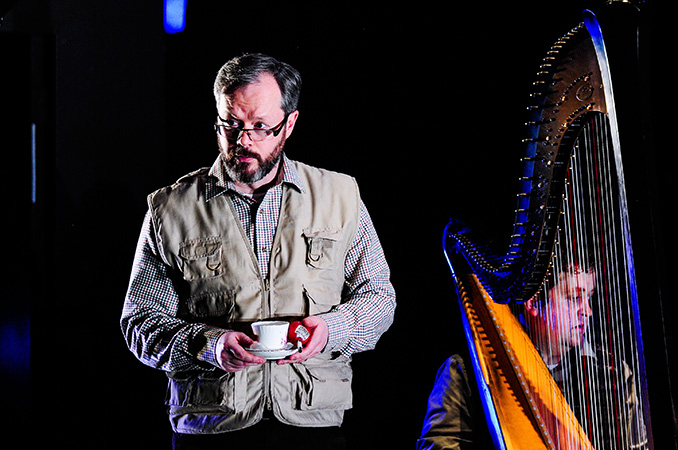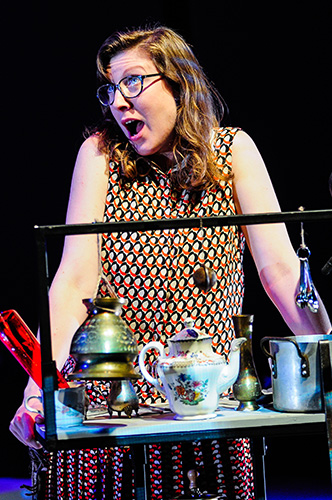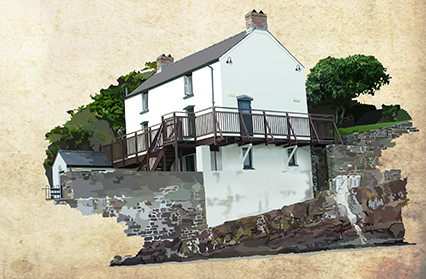Steph Power reviews Under Milk Wood: an Opera by John Metcalf, a heartfelt and highly entertaining adaptation of the Dylan Thomas classic.
Taliesin Arts Centre, Swansea, 3 April 2014
Music: John Metcalf
Libretto: Dylan Thomas adapted by John Metcalf
Director: Keith Turnbull
Music Director: Wyn Davies
Singers: Elizabeth Donovan / Helen Jane Howells / Gweneth-Ann Jeffers / Paul Carey Jones / Michael Douglas Jones / Karina Lucas / Richard Morris / Eamonn Mulhall
Instrumentalists: Pamela Attariwala / Deian Rowlands / Jose Zalba Smith / Paul Stoneman

Dylan Thomas’s iconic radio ‘play for voices’, Under Milk Wood, was over twenty years in the writing. Decades later, John Metcalf’s opera adaptation of the piece has taken more than six years to bring to the stage; a long enough echo of that original drawn-out genesis to tell of the love and care that Metcalf has invested in the project. So it was timely that his opera should premiere in the year of Thomas’s centenary, and equally apt that it should be in Swansea’s Taliesin Arts Centre; named for the progenitor of Wales’s bardic tradition, and located in the town in which both Thomas and Metcalf were born – the principality’s best-known poet and foremost opera composer respectively.
Thomas first mooted a different title for his play: The Town that was Mad. Based on his beloved Laugharne and other homes or hang-outs of earlier days, it is a rich, polyphonic concoction of over sixty larger-than-life inhabitants of the fictional seaside town of Llareggub, rubbing along together (so to speak) in often ironic isolation. The overall portrait is at once affectionate, optimistic and ribald. Yet the name of the town alone – ‘bugger all’ spelt backwards – reveals the ambivalence Thomas felt towards small-town life, and more generally towards the land of his fathers. Today, of course, in a wry turn of cultural identity, his own name has been co-opted to become synonymous with ‘brand Wales’. But for many years after Thomas’s premature death in 1953 (not just from booze but from a combination of serious ailments and medical quackery), the Welsh literary establishment responded to his work with disdain, as Raymond Williams has noted; labelling Under Milk Wood, for instance, as ‘a vulgar, Anglicised betrayal of “Welshness”’.
Metcalf’s setting of the play contains none of this gritty sub-text, but is a straightforward homage to Thomas’s bucolic creation and to the genius of his language. That Metcalf achieves this without fatally compromising that language, so celebrated for its musicality – and, moreover, in a way which sets forth his own musical vision, whilst necessarily cutting a good deal of the original text – is a testimony both to the composer’s skill, and to his self-assurance in navigating what might have been choppy cultural waters indeed. Richard Burton famously described Under Milk Wood as being ‘all about religion, sex and death’ and a ‘comic masterpiece’ to boot. In choosing to emphasise the pastoral, romantic lyricism of the work, Metcalf gently reiterates those themes without upsetting any Dylan Thomas applecarts, and without lifting the lid on the piece itself to examine the more complex psychological forces at work.
However, the resulting adaptation is palpably heart-felt and highly entertaining, and must surely have a wide appeal beyond the ever-growing legions of Thomas fans. Eschewing conventional operatic narrative, Metcalf retains the non-naturalistic approach of Thomas’s radio play, and builds on its occasional ditties and more frequent musical indications to have the characters express themselves in song throughout. Metcalf’s idiom is entirely tonal, and the approachability of his score belies its complex intricacy on a number of levels; dramatic structure, for instance, is cleverly devised through a circular manoeuvre around the chromatic scale starting and finishing at C major, to run parallel with Thomas’s 24-hour schematic from ‘starless, bible-black’ night, to blue day and round again, this time to a night of stars.
A band of five musicians, directed from the keyboard by Organ Morgan in the delightful form of Wyn Davies, double on a range of instruments from ancient to modern; crwth to violin; lever harp to concert harp; percussion, flutes and more. Director Keith Turnbull makes imaginative use of the musicians’ presence on stage, where they join eight singers, including the central, blind observer Captain Cat (Michael Douglas Jones), to become a truly integrated cast. Together, singers and musicians give voice to over thirty characters through a score which they have clearly rehearsed with loving attention to detail.
There are many affecting vignettes. Highlights include the songs of Polly Garter (Elizabeth Donovan), sadly mourning her dead lover Little Willy Weazel, and the comic duo of deceased Messrs. Ogmore and Pritchard (Richard Morris and Paul Carey Jones respectively), united in their trembling before the living spectre of Mrs. Ogmore-Pritchard (a suitably dragon-esque Gweneth-Ann Jeffers). By opting for a floatier feel than Thomas’s earthy bawdiness and cheerfully suppressed quasi-violence, Metcalf’s take on Under Milk Wood tends more towards light, happy dream than a warts-and-all surreality; a mix clearly present in the original, but made psychologically deeper there by Thomas’s more macabrely tinged, dysfunctional core. Indeed, whilst Thomas is never less than affectionate towards and forgiving of his eccentrics, Metcalf occasionally tips overly into whimsy – especially with Rosie Probert, Captain Cat’s lost love; a role nonetheless extremely well sung by Karina Lucas. That said, Metcalf’s humour has its own charm, which captivated the packed Swansea audience with its soft lilt and pace, helped by uniformly fine acting and Turnbull’s unfussy staging.
One of the most successful aspects of the production is the use of foley, or pre-recorded sound effects, combined with live, mic’d and acoustic sounds (water pouring, horns honking, plastic teeth chattering), created by both singers and instrumentalists to form a rich aural tapestry which dovetails particularly well with the percussion. The paradoxical sense of time passing and timelessness that Thomas captures so well is thereby enhanced in Metcalf’s opera, as sounds appear from all directions with or without visible source, functioning as both present and memory. Paradoxically again, this device helps to emphasise the feeling that we are watching a kind of visual radio play; a form that Metcalf shows to be wholly compatible with opera in its broadest yet most intimate sense.
Thomas was undoubtedly a maverick in his day, and his wayward life so often garners more attention than his actual work: as Seamus Heaney once put it, ‘Dylan Thomas is now as much a case history as a chapter in the history of poetry’. Ironically, in this centenary year, there is the risk that Thomas-the-export will become overly synonymous with that aspect of Wales which insists on looking backwards to the past rather than forwards to the future culturally speaking. So it will be interesting to see how Metcalf’s opera contributes to the critical discourse around the work of this brilliant, but once-divisive figure – or indeed, whether Metcalf succeeds in evading those questions altogether, as one senses he might prefer.
In an entirely different way – and with an altogether quieter temperament – John Metcalf is himself a maverick; unafraid to go against the grain, both in his own music (unabashedly tonal when extreme dissonance was the norm, for instance), and in his ongoing, highly successful directorship of the Vale of Glamorgan Festival. Under Milk Wood is his seventh opera and stands as a joyful, personal and universal celebration of Thomas’s spoken play, and yet also of the singing voice, as the composer succeeds in his avowed aim of ‘singing his heart out’. Certainly, Metcalf remains true to the (then) modern-day folk-tale essence of Thomas’s vision. On its own terms, the opera is a great success. In a wider sense, whether Metcalf has gone a little ‘gently’ into this particular ‘good night’ of Thomas’s, so to speak, might ultimately be a matter for history to decide.

Illustration by Dean Lewis
You might also like…
Ahead of the 2017 Vale of Glamorgan Festival, 19-26 May, Wales Arts Review is proud to publish for the first time this on-stage interview with composer and artistic director, John Metcalf, by Steph Power. What follows is a lightly edited transcript of a pre-concert conversation which took place before a live audience on 18 May last year, as part of celebrations for John’s 70th birthday.
This piece is part of Wales Arts Review’s collection, Dylan Thomas from the Archive.
Steph Power is a regular contributor to Wales Arts Review.











